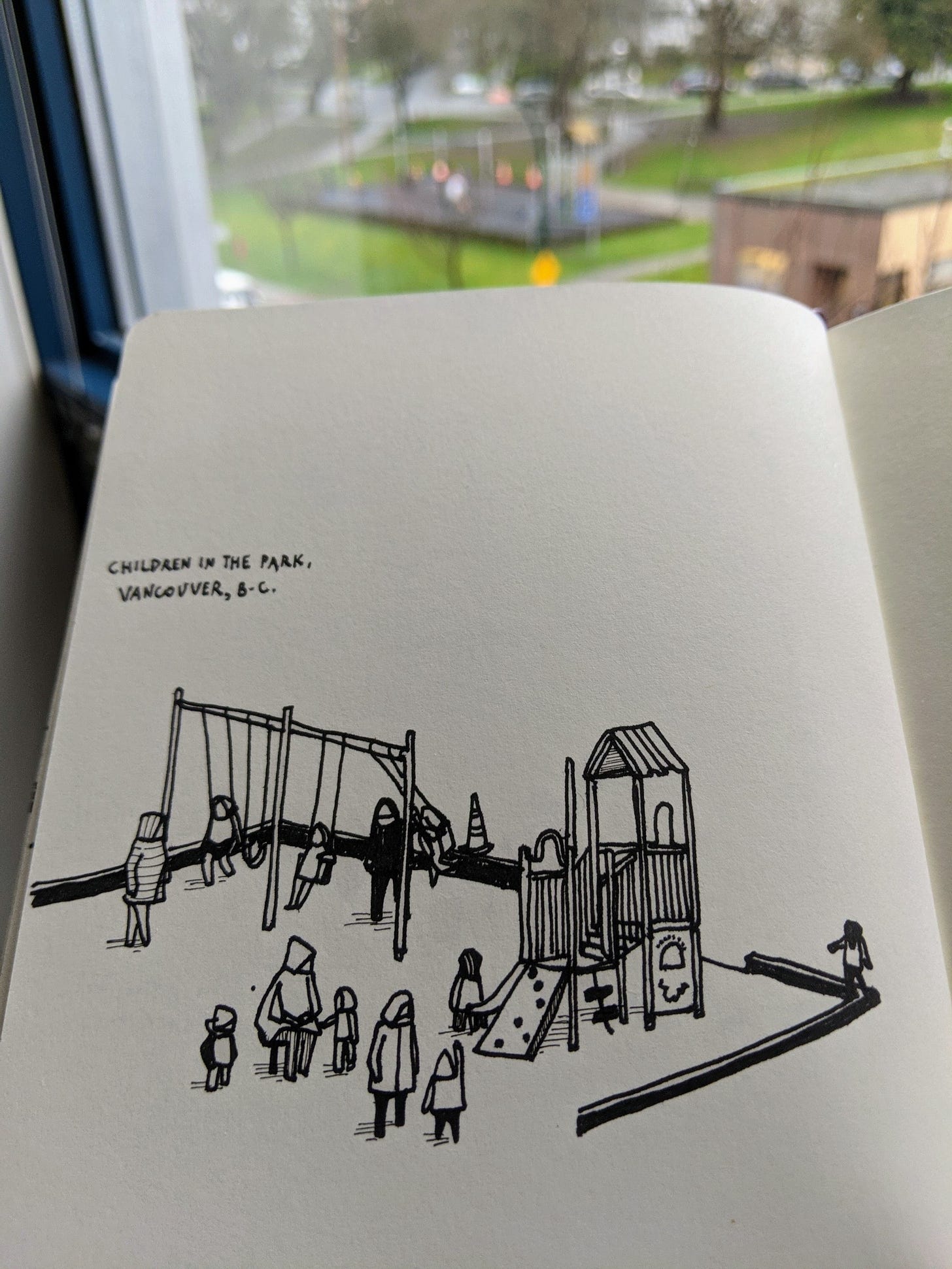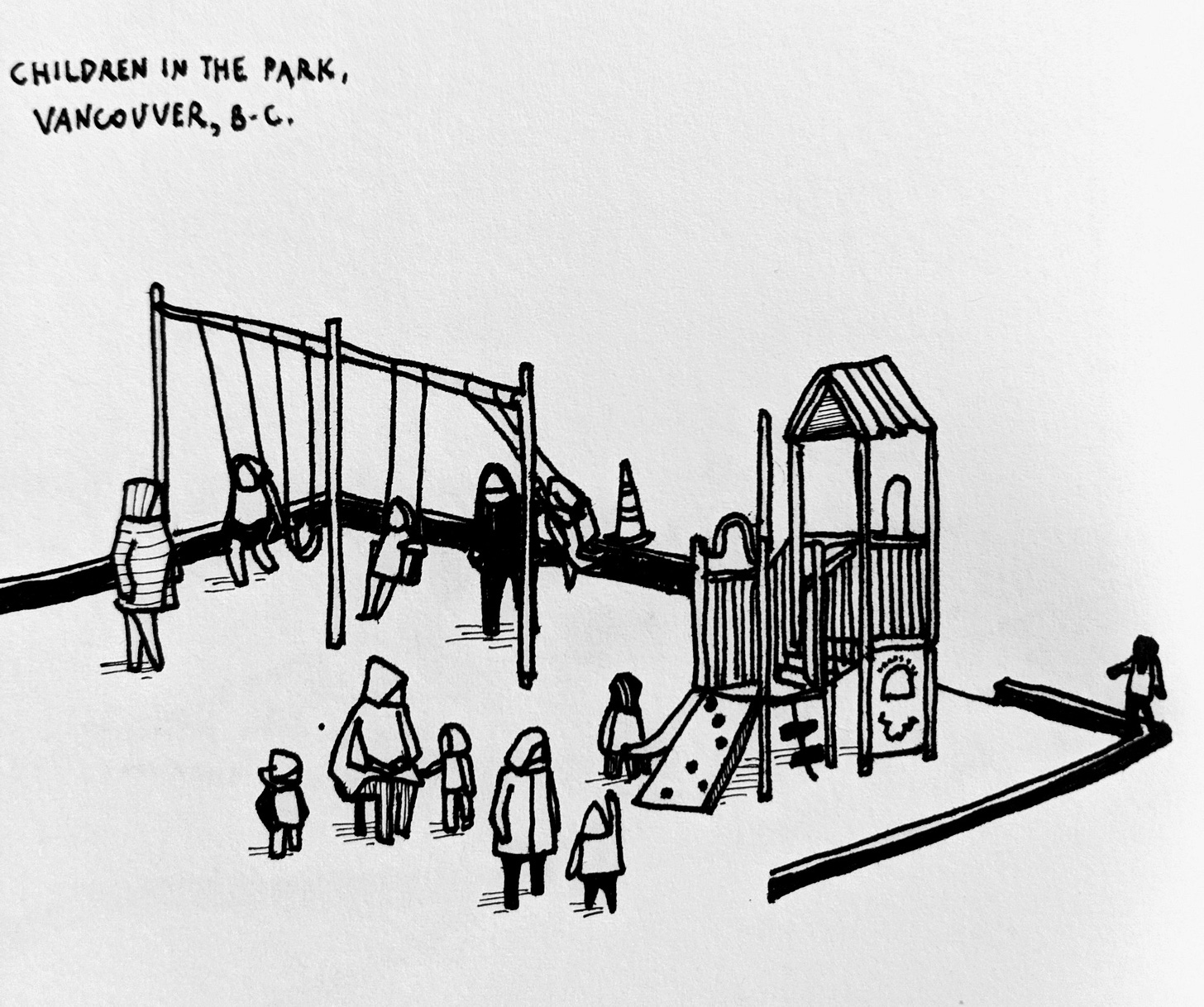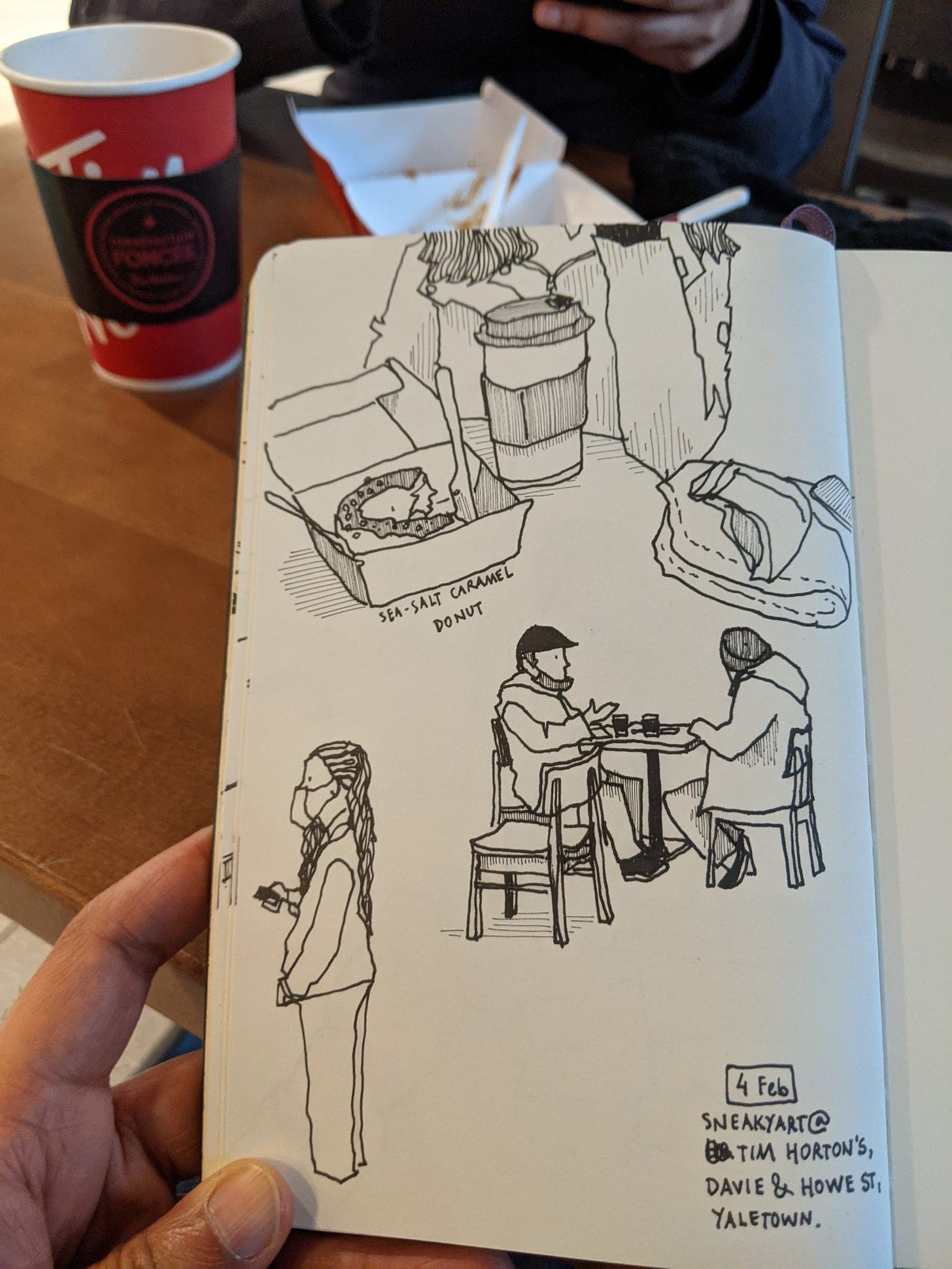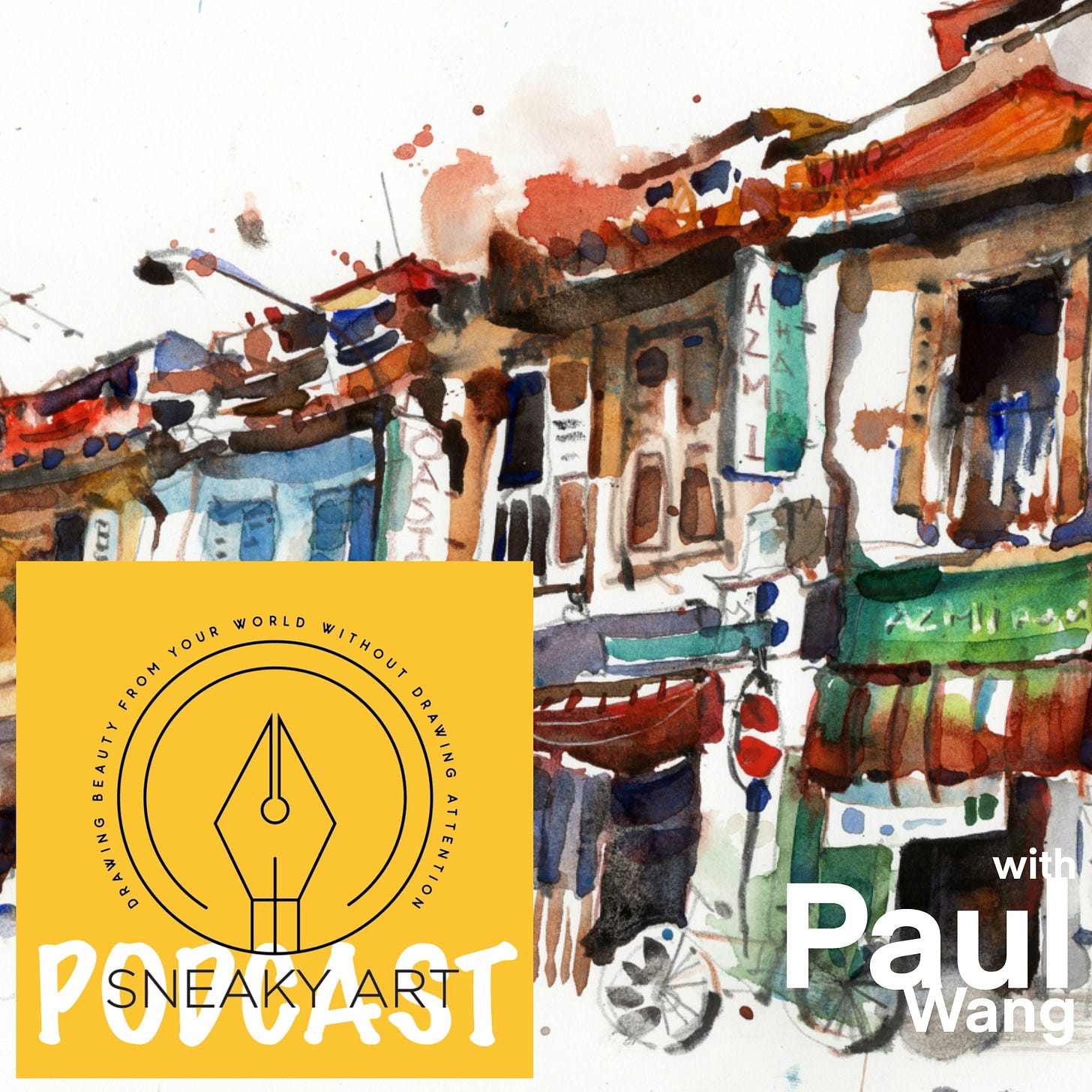#30 - The Importance of Being Earnest
end of quarantine, the point of sincerity, and not trying
In this issue, drawings from the final days of quarantine, freedom at last, and the importance of being earnest. The SneakyArt Post is a newsletter about my art, and journey of self-education as an artist.
Final days of Quarantine
On the morning of Day 13 of quarantine, I see a woman in the park across the street. I have seen her on many mornings before. She wears a white jacket and carries two plastic bags to a bench in the middle of the park. The sea-gulls and crows are expecting her. They caw in greeting, and fly in circles around her. She proceeds to throw bread-crumbs at them.
Later, I hear the children from the daycare center playing in the park. I am jealous of little children, and also feel an enormous pity for them. I feel pity because they will be left with a terrible world full of terrible existential threats. Everything is fucked and the stock market won’t save the planet. Still, I am also jealous. I am jealous that children can just be who they are. Children can just be. They do not have guile and do not understand subterfuge. They are not yet educated in how to be properly ashamed of themselves. They take pure delight in small wonders. It is the way to live.
I draw them within the play area that is their private universe. Nothing exists outside it, nothing else matters, so I do not draw anything else. It is a complete world, populated with some adults to answer their many questions and to push them on the swings.
The Importance of Being Earnest
It is important to be like a child. I was thinking about this earlier today, when I was asked a question by somebody. The question came from a prompt shared in a writing group I am part of. The question rested on our fundamental inability to change others’ minds, whether it be politics, or social structures, or simply “the way things should be”.
The question was - “What incident changed your point of view about something important?”
Many things came to mind. But I thought about the children in the park, and the important answer became clear to me. It was not an incident that caused the change. I am not sure what it was. But I think it may have been a book. It may have been Kurt Vonnegut’s Breakfast of Champions.
When I was in Class 7, my English Literature teacher declared - “Nishant, you are the most cynical person I have ever met in my life!” I don’t recall what prompted it, but I think I deserved it. In any case, I grinned and thanked him for the compliment. You see, I was 12 or 13 years old, and the idea of being cynical beyond the imagination of a grown adult tickled me to no end. Cynicism was smartness. Cynicism was pragmatic. Cynicism was the way of adults. I took pride in my cynicism. It helped me fight off insecurities before the popular guys in school. It helped me deal with my social inadequacies. It gave me a sense of humor. I won many battles with the sharp edge of my wit. Over the years, I honed it to terrific sharpness. In college, a professor told me to not be over-smart. I asked him to explain exactly how smart I should be in that case. He kicked me out of the class, but the rest of the students laughed, and that was my win. I made funny comics, mocking the idiosyncrasies of my friends. I wrote funny stories with elaborate dialogue and plots that pointed to the foolishness of trying, the inevitable failure of all action. I made a lot of people laugh. I wrote a blog-post about Bollywood hypocrisies that went viral on Twitter. A journalist at CNN-IBN retweeted it saying - “The sarcasm in this piece could shrivel grapes.” I glowed with pride. It came easily to me, and the best/worst part was how good I was at it.
But one day, I found the fountain of my creativity had gone dry. I could not write. After struggling for many months I came to the conclusion that I had reached the end of the tether with cynicism.
Cynicism is like a wall we build inside our mind. Brick by brick, we do it to protect what is most vulnerable inside us. We hide that thing behind walls so others cannot know, so they cannot mock us the way we mock them. It shields us from people, and also from other horrors of the outside world - pain and fear and shame and rejection. Nothing cannot breach these defenses. Every year, the walls grow higher. Every morning, you climb the ramparts and rain arrows upon the enemy at the gates.
The climb is a little harder everyday, the descent long and laborious. On some days you don’t have energy left for anything else. Then one day the walls are so high you cannot climb them anymore. The walls are so high that nothing else exists in this world except yourself. Your wit, starved for enemies, turns on itself. You are the one it hurts now, and the walls are too high. No one can hear your screams.
I realized that in order to be a writer I had to embrace shame and fear and pain and rejection. I had to lower the walls, so that I could see further. I had to reach out and embrace everything. In this way I could make my world bigger. I had to be vulnerable to be truly strong.
Kurt Vonnegut helped me do that. I will not describe how, but if you read Sirens of Titan or Mother Night or Cat’s Cradle you can find out.
I cannot say if this made me a great writer. It’s not my business to make that kind of assertion. But it’s the biggest reason I was able to become an artist.
Post Quarantine
Quarantine ended today and I went out for a run. Later in the day, we went apartment-hunting. Afterwards, we stopped at the most Canadian place I could find to draw - a Tim Horton’s cafe. I stepped inside a cafe for the first time in nearly a year. I drew a stranger at a cafe after nearly a year. It felt good.
Tomorrow we will go to apply for a driving licence. If it takes as much time as it takes at an American DMV, I should be able to make a few drawings.
Don’t Try
I was chatting with a friend about the nature of online debate. He wanted to criticize a book about private prisons, but felt that any criticism would be construed as a defence of the private prison industry. He thought this because any discussion online is “by nature, binary”. There is no room for nuance, he complained, because we cannot look at things dispassionately anymore. He suffered the same problem, he conceded, whenever he argued about something he genuinely cared about.
I think we are unsuited as human beings to having so many conversations without visual or auditory cues. It is a recent phenomenon, not even 20 years old, that we argue about everything online. In the early days of the internet, the topics of conversation were limited. Today they include fierce battles with complete strangers over the deepest issues of our lives - the way the world works, the way it should, and what is good and what is evil. These debates yield no winners. They only have bitterness to give on both sides. They are fought with the dullest weapons at our disposal - our words and their meanings. We have no idea what we’re doing.
“If only we had more information…”
It is a flawed idea that more information is always good. Beyond a threshold, humans are unable to process further information. Once saturation sets in, even hard facts cannot make an impact. The mind, in a bid to rationalize its world and not go completely insane, regresses to its confirmation biases.
Now many people will tell you it is possible to rise above one’s confirmation bias, if only we become aware of it, if only we become unbiased. They are either deluded or trying to delude you. We cannot rise above our biases simply by knowing of their existence. We cannot even fully know our biases. That is the very nature of a bias and the nature of humanity. It is foolish to pretend that we can become objective arbiters of the truth, if only we trained our minds. You will see the process of training one’s mind is, again, a process of taking in absurd amounts of information. It is bound for failure.
There is only one kind of information that can help, and that is anything that makes it easier to accept your humanity and the humanity of others. Kurt Vonnegut can help. Charles Bukowski can help. And all good art everywhere.
Podcast Announcement
The SneakyArt Podcast returns in a week! Until then, revisit Ep 10 where I speak with Singapore-based educator and artist Paul Wang about the way he dances, using line and color, across the page. He tries to tell a story with every piece, and that influences every artistic decision - color and line, collaboration and conflict, work and play.
Spotify | Apple | Google | Gaana | JioSaavn
Thank you for reading. See you next week.






